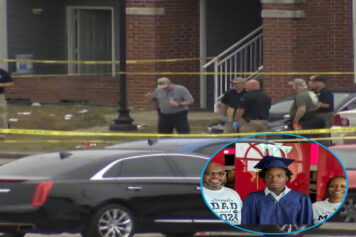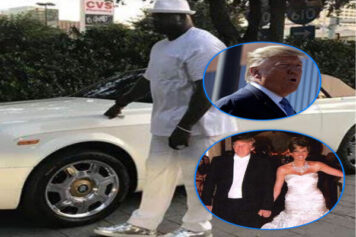The entire morning Pete’s Jazz has been on my mind. Props for that sir.
Pete Rock: Wow. That's my song. I love that beat too. Thanks.
Has to be an exciting and gratifying time this being the 20th anniversary of Mecca and the Soul Brother. You're on tour. Did you realize back then how that particular project would be perceived now?
Pete Rock: You know what, when we finished the project, we were so blown away by the way it sounded. We were like this is different hip-hop. A different sounding hip-hop. Listen to the way the beats change up. The kicks and snares were poppin' at you. The samples are unheard. Like, oh my God. We didn't know what we had on our hands, but we knew it was something good. When we saw the reaction to Reminisce, we were like we did it man we did it.
Cracking the CD, I remember thinking how dope the interludes were and being excited to hear what interlude was coming next after a track went off.
Pete Rock: Wow that's crazy. Those interlude beats were starts of a beat. Some of them would be a beat — something normal, a sound here or a bass line, or a full main beat. Nobody was really rhyming so we just let people hear it.
I just felt like songs go off and people wait for the next song. Let me put something in between to make it more exciting. That was exactly my mindset.
The interludes worked bro. Big time. The whole jazz vibe. Miles Davis' Doo Bop dropped shortly thereafter (Miles passed before project was completed). Hip-Hop and jazz were almost synonymous at the time. Can you speak on those times and what inspired you along those lines?
Pete Rock: My dad played lots of jazz. He's Jamaican. We came up on reggae all day everyday. The jazz? Something about jazz did something to him. All of the sudden he began collecting all these jazz records. He and I would listen when I was a child. I kinda of just grew into it and learned more about it as I heard other people. jazz is a big spectrum.There's psych jazz, funk jazz, regular jazz…be bop. I was into it because of all the differences. Very into it. Roy Ayers and Miles Davis. Herbie Mann…I can name countless people. Herbie Hancock. These are some that I loved. Even the fusion jazz – Spyra Gyra, Chick Corea and Return to Forever, Stanley Clarke. That kind of jazz. R & B, soul. Countless music inspired me growing up.
I picture your Pop spinning doing his thing and you like Peyton and Eli or Ken Griffey Jr. soaking it all up like they would in the locker room or clubhouse when their fathers were performing on the field. Just being around the game. You being around the music.
Pete Rock: Exactly! It was just like that. He would bring his sons with him. I will never forget a Christmas night I was in the booth with him. It was when Flash and those guys were coming out. It was a song called Super Rappin'. The Funky 4 + 1 more. All that was brand new back then. We used to get our kicks off it like "what's this?!?" Holy mackerel. Then the Sugar Hill Gang came out. All this stuff was droppin' in the '80s. It went from mix tapes in the late '70s and early '80s to an explosion of a new genre. It really made a great change. Thanks to Cool Herc and (Africa) Bambaataa. That's my school. That's where I come from.
So, uh, do you have any Ohio Players album covers?
Pete Rock: Of course I do man! That's my favorite funk group besides Kool and the Gang and The JB's. Those are the three. Those three right there are the main bands growing up that had my attention. They really had my attention like how did they do this? I remember thinking.
Man we could talk all day about that era. Let's get into the '90s. There was an explosion and it just wasn't limited to hip-hop. You and CL put your stamp on the game and gave us something to rock to.
Pete Rock: Aw man. It was great. It was time for a change. God was working with me somehow. All of the sudden, the beats I was making…I was always at it. I was in my room and would never come out. I just tried to learn that drum machine and master it. Next thing you know, it started sounding like something. Then Heavy D – rest in peace – brought it out of me.
That pain that became T. R. O. Y. Did it give you something spiritually that helped you move forward professionally?
Pete Rock: It was in me from the start. When Hev saw it, he really saw it. He was like yo you got something bro. Let's work on it. That's exactly what he did. Next thing you know I was moving in the music game.
Hip-Hop was a little bit different at the time. Everyone seemed to be working with each other. Not just in the videos. You all were hanging out with each other. Becoming the greatest of people together.
Pete Rock: Yes. There were no egos involved. Everyone was excited about where hip-hop was going. I think we showed it with each other. Befriended one another and hung out. That was going on for a nice minute. Then things began to change. Egos get out of wack. Go south. Friendships go south too, but the respect will always be there from other artists. You've grown nicely with the game. You know what it is to be a man and how to handle yourself.
The remixes man. You were killing the game. The soul of the tracks. That chill. The Respiration remix. My goodness. Those tracks are like therapy. Was that by design?
Pete Rock: Yep. Music is part of the movement in your soul. To me, depending on what kind of music it is and how it's coming across, it molds you. It's molded me into the person I am today. It's part of raising "a children." It's like another father that we look to. Music was a second dad that taught us very well. We definitely need that in this game.
Getting credit for your work. How many beats you think you have out there that aren't recognized?
Pete Rock: When you google my name, lots of things come up. People can learn who I am from that. When they see me or see me again, they're like yo, I didn't know you did this or that. It makes me feel good to see a younger guy that's like 17 years old saying that to me. I'm like wow, you basically weren't around when I was doing this. Probably just a little snot nose or something.
That's what I was interested in. How are you perceived by the younger folk? There seems to be a creativity out there that's very encouraging. Another era of hip-hop is upon us.
Pete Rock: It's another expansion on the game. It's a part of rap and hip-hop that I think is very clever. Kanye West is one of my favorite producers right now. Just listening to what he does. There are many other guys out there that I listen to and I think are clever in the way they make their music. It drives me to keep on my toes and still love what I do. The younger generation is great but then you have some that need to learn a little more.
I really don't care about who is what right now. It is what it is. Nothing is changing unless we put our collective thoughts together and do what we do out here. I used to complain a lot. I learned to live with it and it's not bad. The respect is there with some of the young dudes. You have some that just don't learn and don't know. A lack of knowledge can really be a detriment.
Good thing for the fans is that you and Lupe settled your differences. I'm glad that happened. Can you expand on how you two have moved forward?
Pete Rock: He taught me to not be so offended when it comes to someone showing respect for what he did. That's it. I don't care to really talk much about it other than I think he's a great artist. Hopefully one day God will let us do something (together).
That would be dope. The relentless work. If an artist approaches you, what goes down? Is it about adapting to their talent, vice versa or otherwise? What's that process for you as the producer?
Pete Rock: I just think that with some artists, they try to find what fits for them. I get it because that's how the world works. You're looking for stuff that fits you. Your not gonna rap on or get in a suit that don't fit. It's a normal way of work. It's like hey I'm looking for something my audience can adapt to. I get it. Part of being a producer is you have to be versatile. You have to get in their mode and in their head to see what they like and interpret it for them.
Working with Robert Glasper and Yasiin Bey on Glasper's project. How talented is he?
Pete Rock: Robert Glasper is one of the greatest piano players out today. Keyboards. He just was nominated for a Grammy. I didn't even know that. It blew me away. Doing something on the Black Radio EP. The remix. I was happy to hear that. He's great.
You and Premier's project. What the hell do you two behemoths talk about?
Pete Rock: We're real dudes so it's normal. It ain't nuthin. When we do talk about work it's about what we are going to do when we're performing together. Other than that, we talk about normal things like normal dudes.
When does that drop?
Pete Rock: Hopefully in '13 man. We can't put a finger on it yet, but hopefully next year. Somehow, someway, we'll hear something.
Last on music. Monumental. Smif-N-Wesson. What's the connection? Brooklyn?
Pete Rock: Yup. Those are my boys from Brooklyn. Bed-Stuy and Brownsville. That was bound to happen. We talked about it for years and one day we were like you know what? Come on, stop playin'. That was just one of the things, recently, that happened. 2011. I was happy about that release.
On occasion, I'm asked as a writer if I have a favorite piece. It's never answered correctly? I'm sure it's quite difficult with all of the stuff you've done.
Pete Rock: Yeah. If you've made a lot and have had a nice career in the music business, it's hard to take from people you've worked with — like Rakim, Public Enemy, Redman to the Wu members. It's hard to pick which one is your best production, but my heart is rapped around Reminisce right now. Losing Hev and losing Troy…you can hear it everywhere.
It's funny you mentioned PE. Talking to Chuck about Public Enemy's Hall of Fame induction. You want to shout him out?
Pete Rock: Who Chuck D? He's the greatest man on earth. So appreciative they gave me a shot because they didn't have to give me a shot. They didn't have to use me as a producer. I felt like when I got the job I had to really prove myself and make my mark to get people to try to like something. I put my best foot forward man. I was so anxious to do that and get it right.
For them to be inducted in the Rock and Roll Hall of Fame? Something outside of hip-hop? That's huge. Shows you the work put in to hip-hop that got him into that spot. Says a lot to the whole hip-hop community. To fans and myself, we're just so proud of Chuck D.



